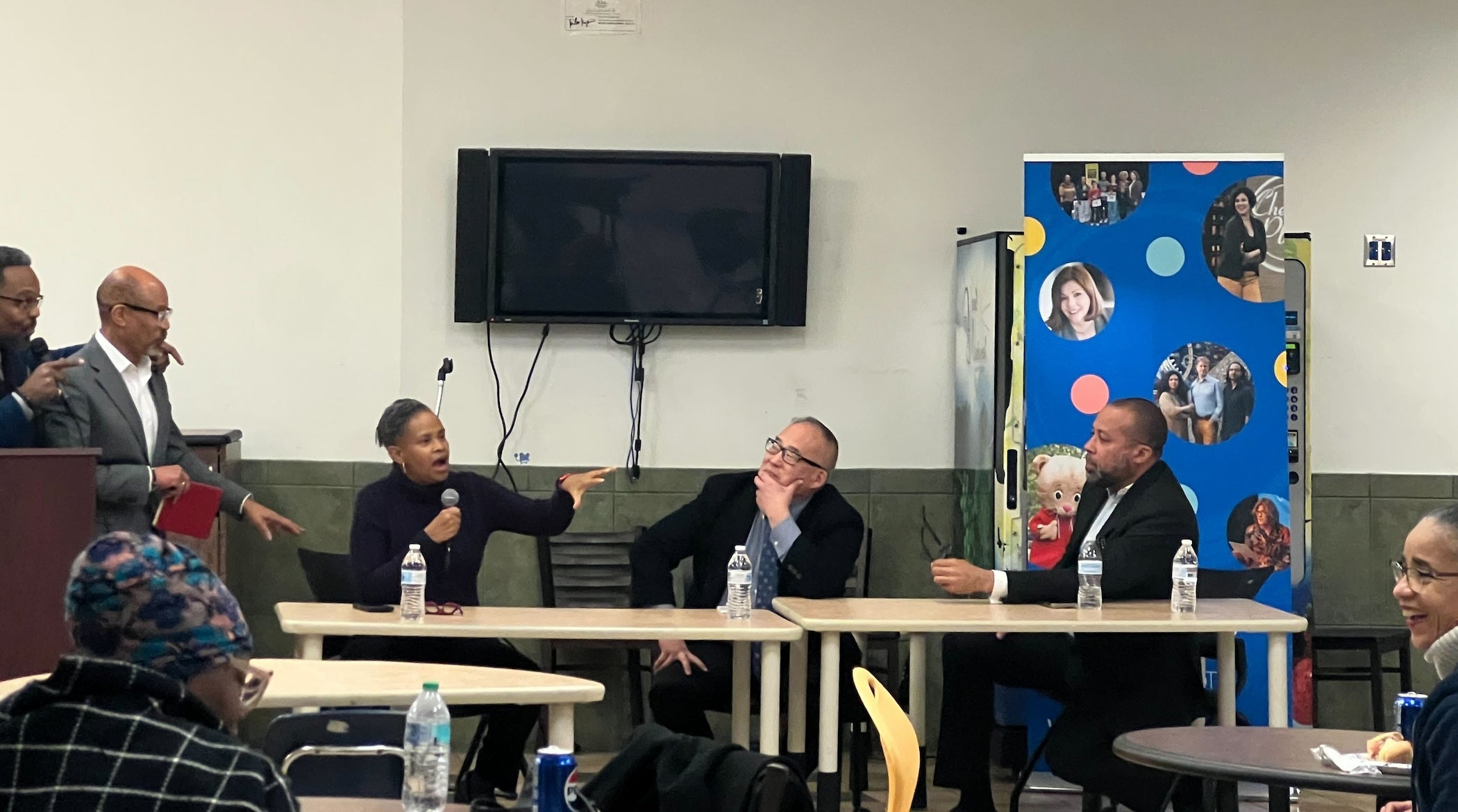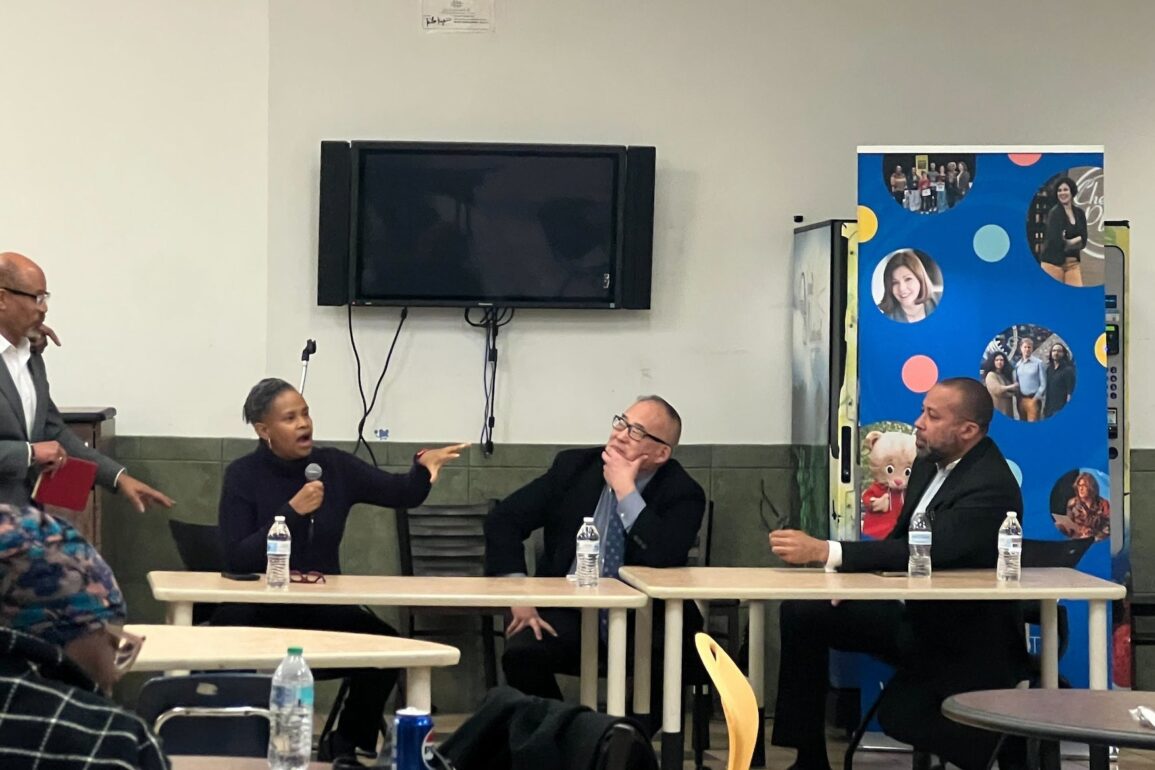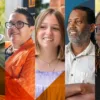
From Philly and the Pa. suburbs to South Jersey and Delaware, what would you like WHYY News to cover? Let us know!
Words from a speech by Dr. Martin Luther King hovered in the air long after the recording stopped playing last night at the School of the Future in the Parkside neighborhood of Philadelphia. It was King’s “Give Us the Ballot” speech, delivered at a 1957 rally pushing the federal government to enforce the Brown v. Board of Education decision, which echoed in the school’s cafeteria.
“Give us the ballot, and we will no longer have to worry the federal government about our basic rights,” the reverend proclaimed on tape. Towards the end of eight minutes, his voice urges the crowd in Washington to follow “a type of love which will cause you to love the person who does the evil deed.”
In the intense conversation that followed, panelists and audience members grappled with the world King had spoken to then and the world as it is today. President-elect Donald Trump’s win — and rapidly approaching inauguration — was at the core of the discussion.
The “Conversations of King” panel, an annual joint project of NewCORE and WHYY, brought Temple University Assistant Dean David W. Brown, Reverend Dr. Leslie Callahan of St. Paul’s Baptist Church, Reverend Dr. Marshall Mitchell of Salem Baptist Church and former Republican Councilmember and mayoral candidate David Oh to the mic. Debates between the leaders centered on how to build political power and opportunities for the citizens to come together following a contentious national election.
About 50 Philadelphians gathered on King’s birthday for the discussion.
Panelists first answered the question of when they feel they had been silenced in their lives; Oh cited his time in Philadelphia’s City Council. Brown, moderating the group, followed by asking the group which voices they believed were not being heard in the current political environment.
“The economic voices of African Americans are simply not being heard,” Mitchell said, placing some of the blame on what he described as out-of-touch leaders.
“We have a class of African American leaders — whether it’s in church, in government — who have woeful amounts of economic insight into how America functions. And, in many instances, it seems to me like we’re the only group still fighting at such a basic level with unarticulated desires for Black people,” Mitchell said.
“I say this to elected officials who come to Salem: Say to my congregation precisely what you said to a synagogue on Saturday,” he added. “Don’t tell me you like gospel music. Tell me what your visit means for the economic interest of Black people, period. Not for people of color. Because on Sunday morning, I don’t preach to people of color. I preached to Black people.”
Oh took a different angle in his response.
“I think the people who aren’t listened to is half the country, by the other half of the country,” the former councilmember said.
Oh argued that keeping an open mind about voters helped him win his 2019 reelection. After ranking lower than he had in years during the primaries, he shared that he initially assumed that a new wave of Trump-aligned Republicans did not want to see a person of color or a moderate representing them — but upon further research, concluded that some of those voters could have been drawn to “change” candidates above all else. He adjusted his brand.
“I just kind of retold what I’d like to do saying ‘I have a history of fighting the establishment for I think the things that you would like to see,’” Oh said. “And I did end up winning that election.”
Callahan, meanwhile, argued that new methods of communicating and distributing information could be leaving swaths of voices unheard in ways we might not be aware of.
“I think since we’re going to talk about King, we have to talk about what it was like when he was doing his work, and what we might be dealing with in the future of unprotected voting rights and rolling back of various protections,” Callahan said.
She also noted that King was harassed and threatened by the FBI for the last decade of his life.
“Black people being good and honorable and peaceful has never stopped racists from being racist,” she argued. “Being good has never kept Black people safe. Working hard has never made us rich.”
Audience members hummed in agreement, breaking out in scattered applause.
Mitchell took the conversation in a more material direction.
“I do think we have to do the King thing, in love. But not for everybody, because some people are off the continuum of decency. And so for that group, there’s only one thing you can do: you must beat them. And I argue for economics because beating them requires a dollar bill,” Mitchell said.
“You saw, earlier in the week, unvarnished power,” he said, referencing the Sixers’ stunning reversal on their arena location after Comcast, the NFL and the NBA weighed in. “I don’t do the right or wrong evaluation. I’m just telling you the dynamic. When the big folks were ready to make a decision, they made a decision. And the system, the entire system, had to respond to that. And the only reason the system had to go along is because of money.”
“That’s right,” an attendee called out.
“I know I’m right!” Mitchell said back, to some laughter.
“It ain’t about morality,” he added. “I love King … But if you are in a system that reflects response to power, you are bringing a knife fight to a nuclear war.”
A tug-of-war over the mic between Brown and Callahan ensued as the panel wrapped up, with the St. Paul’s pastor wrenching it free long enough to point out the impact of the Supreme Court’s ruling on Citizens United v. Federal Election Commission in 2010, which determined money’s role in political power.
Jenette Jones-Jackson, a Philly churchgoer who lives in Norristown, was among the evening’s attendees. She said she was surprised to hear from a majority-Republican panel. Mitchell mentioned he had most frequently voted for GOP candidates. Jones-Jackson said she found the discussion more relevant to her life than she expected. She was shocked when Vice President Kamala Harris lost the presidential election in November and has been working to make sense of it all.
“It made me realize that a lot of the things I thought were common knowledge aren’t very accepted — like, things that I believe in aren’t important to other people as to half of the country,” she explained. “So yeah, it was a wake up call for me.”
The question of how to hear voices that have been silenced, Jones-Jackson said, seemed particularly apt for this moment.
WHYY is your source for fact-based, in-depth journalism and information. As a nonprofit organization, we rely on financial support from readers like you. Please give today.



